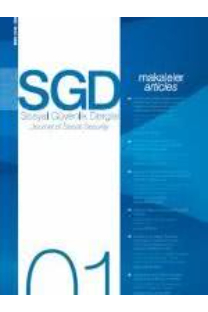AB Ülkelerinden örneklerle refah sistemlerine göre asgari gelir uygulamalarının karşılaştırmalı bir değerlendirmesi
A Comparative evaluation of minimum ıncome applications with examples from EU countries according to the welfare systems
___
- Aldemir, Şansel (2003), Küreselleşme Aşamasında Yoksulluk ve Refah Politikaları, İstanbul Üniversitesi SBE, Yayınlanmamış Doktora Tezi, İstanbul.
- Çelik, Abdülhalim (2002), Küreselleşme Sürecinde Sosyal Güvenlik Sistemlerinin Dönüşümü ve Türkiye, Kamu-İş Yayınları, Ankara.
- Ekdemir, A. Şadi (2009), Avrupa Birliği-Türkiye-Uluslararası Sosyal Güvenlik Uyum ve Eşgüdüm Normları, Hak İş Yayınları, Ankara, 2009, http:// www.hakis.org.tr/yayinlar/sosyal_guv_ es_gudum.pdf (11.03.2014).
- Gökçeoğlu Balcı, Şebnem (2001), Güvenceli Asgari Gelir, Galatasaray Ünv. SBE, Yayımlanmamış Doktora Tezi.
- Heikkila, Matti (2003), The Role of Social Assistance as Means of Social Inclusion and Activation A Comparative Study on Minimum Income in Seven European Countries Report 1-Contexts, National Research and Development Centre for Welfare and Health, Helsinki, Finland, http://www.stakes.fi/verkkojulk/ pdf/socasstre port1.pdf (10.06.2003).
- Henriques, Manuel (2003), The Guaranteed Minimum Income Schemes in the European Union, the Crisis in the European Social Policy Model and the Lessons from the USA Working Paper 13, 2003, http://investigacao. ulusofona.pt/CEE/docs/wp13_ULHT.pdf (04.12.2003).
- Karaca, Nuray Gökçek (2004), Asgari Gelir ve AB Ülkelerindeki Uygulamaları, (Nisan Kitabevi, Eskişehir).
- Kurtulmuş, Sevgi (1997), Teorik Esasları ve Tatbikatları Bakımından Aile Ödenekleri, T.C. Başbakanlık Aile Araştırma Kurumu Başkanlığı, Yayın No:102, Ankara.
- Moreno, Luis (2000) Europeanization and Decentralization of Welfare Safety Nets, Unidad de Políticas Comparadas (CSIC), Working Paper: 00-10, 2000, http:// digital.csic.es/bitstream/10261/1514/1/ dt-0010.pdf (11.03.2014).
- MISSOC, Guaranteed Minimum Resources, Germany in All EU Countries, http://www.missoc.org/
- M I S S O C / I N F O R M AT I O N B A S E / C O M PA R AT I V E TA B L E S / M I S S O C D A T A B A S E / c o m p a r a t i v e Ta b l e S e a r c h . j s p (10.01.2014).
- MISSOC, Guaranteed Minimum Resources, United Kingdom in All EU Countries, http://www.missoc. org/MISSOC/INFORMATIONBASE/ C O M PA R AT I V E TA B L E S / M I S S O C D A T A B A S E / c o m p a r a t i v e Ta b l e S e a r c h . j s p (10.01.2014).
- MISSOC, Guaranteed Minimum Resources, Sweden in All EU Countries, http://www.missoc.org/ M I S S O C / I N F O R M AT I O N B A S E / C O M PA R AT I V E TA B L E S / M I S S O C D A T A B A S E / c o m p a r a t i v e Ta b l e S e a r c h . j s p (10.01.2014).
- MISSOC, Guaranteed Minimum Resources, Spain in All EU Countries, http://www.missoc.org/ M I S S O C / I N F O R M AT I O N B A S E / C O M PA R AT I V E TA B L E S / M I S S O C D A T A B A S E / c o m p a r a t i v e Ta b l e S e a r c h . j s p (10.01.2014).
- Noguera, José A. (2000), Basic Income and the Spanish Welfare State, BIEN 8th Congress, Berlin, October 6-7, 2000, http://www.basicincome.org/bien/ pdf/2000Noguera.pdf (11.03.2014).
- Sözer, Ali Nazım (1998), Türkiyede Sosyal Hukuk, Barış Yayınları, II. Baskı, İzmir.
- Sözer, Ali Nazım (1997), Sosyal Devlet Uygulamaları, Türkiye İşçi Emeklileri Cemiyeti, İzmir.
- UKCOSA, Welfare Benefits, http://www. ukcosa.org.uk/image-es/welfare.pdf (25.05.2003).
- ISSN: 2146-4839
- Yayın Aralığı: 2
- Başlangıç: 2011
- Yayıncı: SOSYAL GÜVENLİK KURUMU
İktisadi kriz karşısında sürdürülebilir' refah devleti
İnsana yakışır iş kavramı bağlamında Türkiye'de ev hizmetinde çalışan kadınlar
Sinem YILDIRIMALP, Emel İSMAİLOĞLU
Sosyal güvenlik hakkının yargıtay kararlarına yansıması
Gelişmiş ve gelişmekte olan ülkelerde dışa açıklık, demokrasi ve gelir dağılımı ilişkisi
Seyhettin ARTAN, CEMALETTİN KALAYCI
Occupational safety experts in the law no 6331: Qualifications, assignments and authorizations
